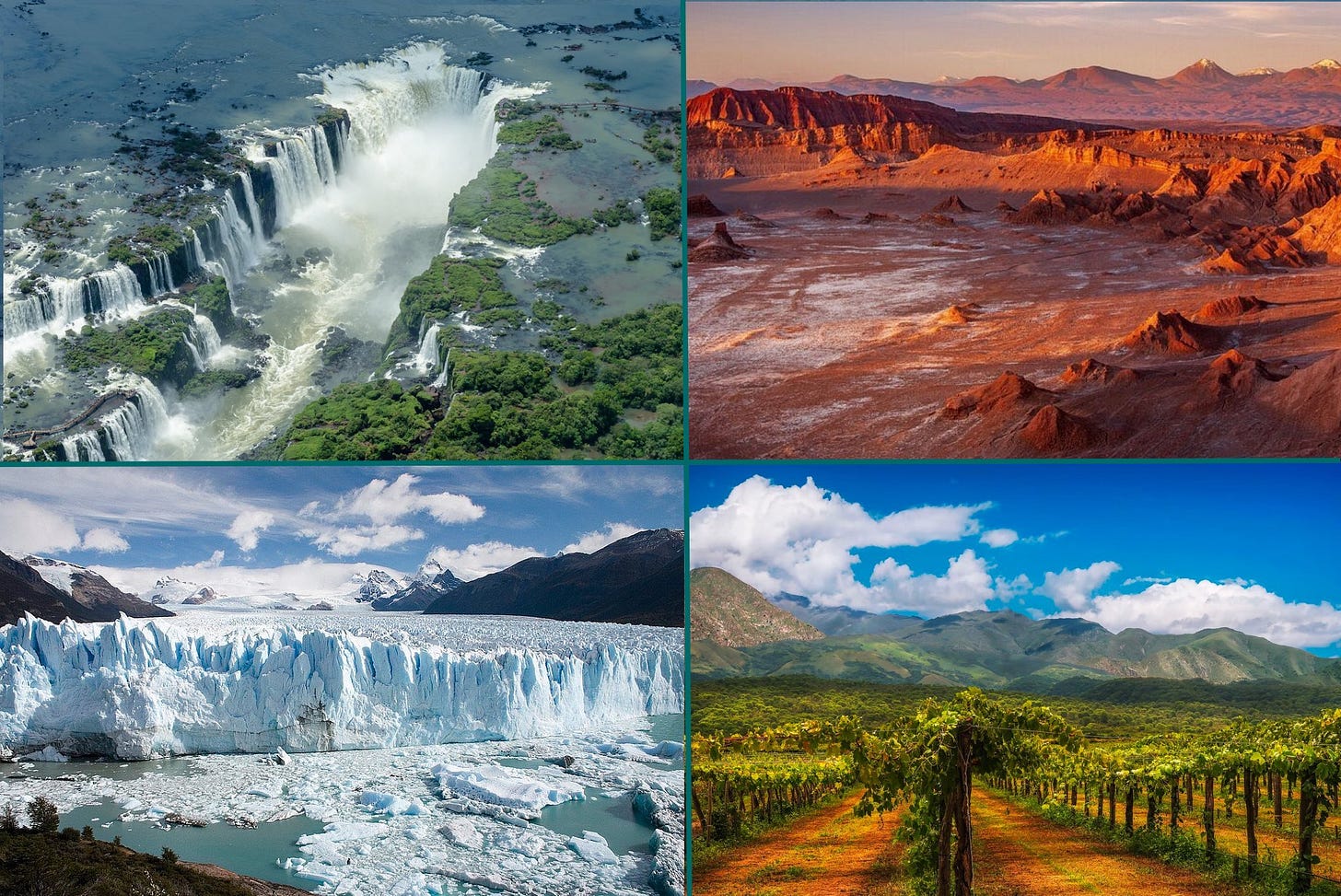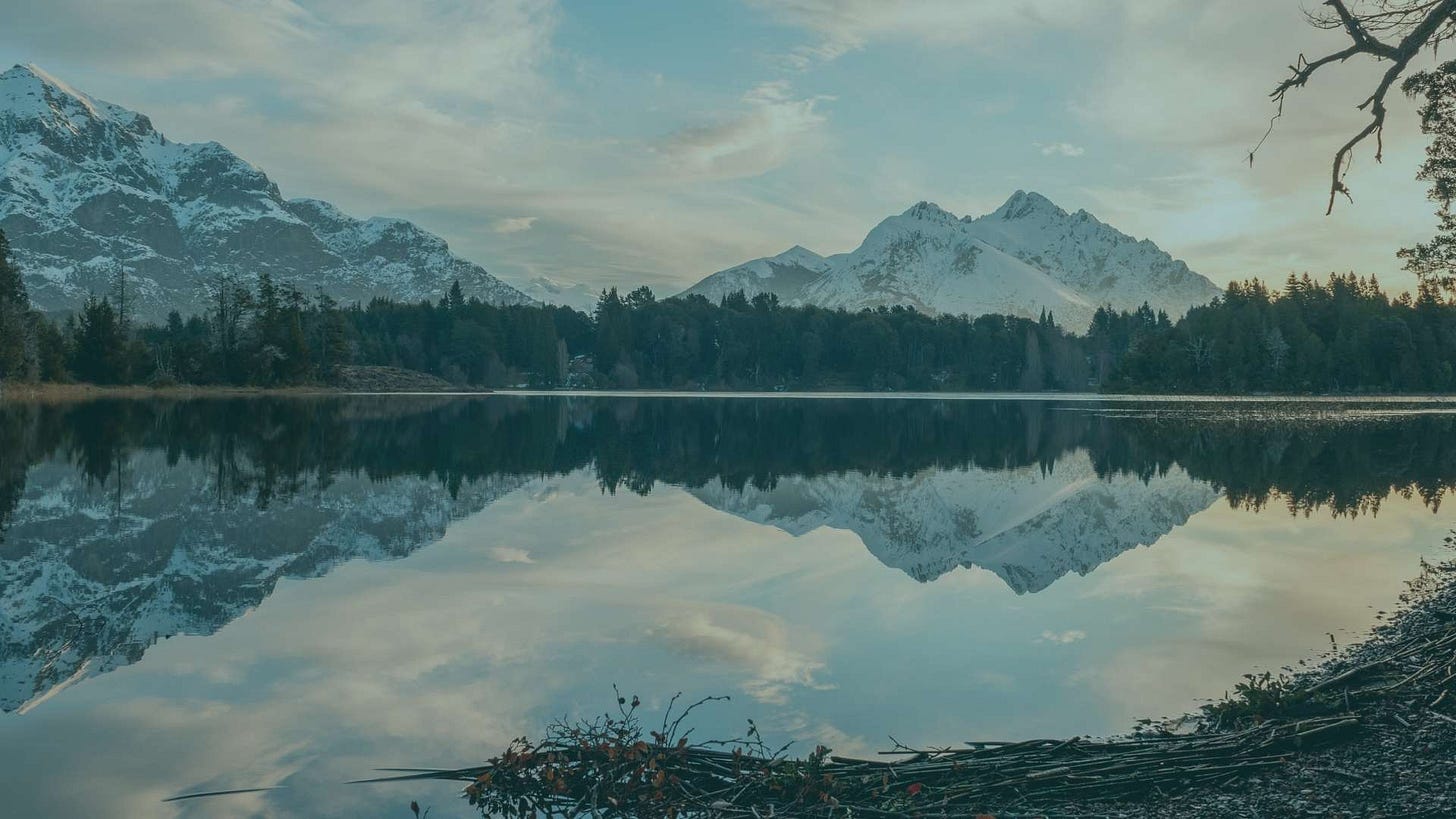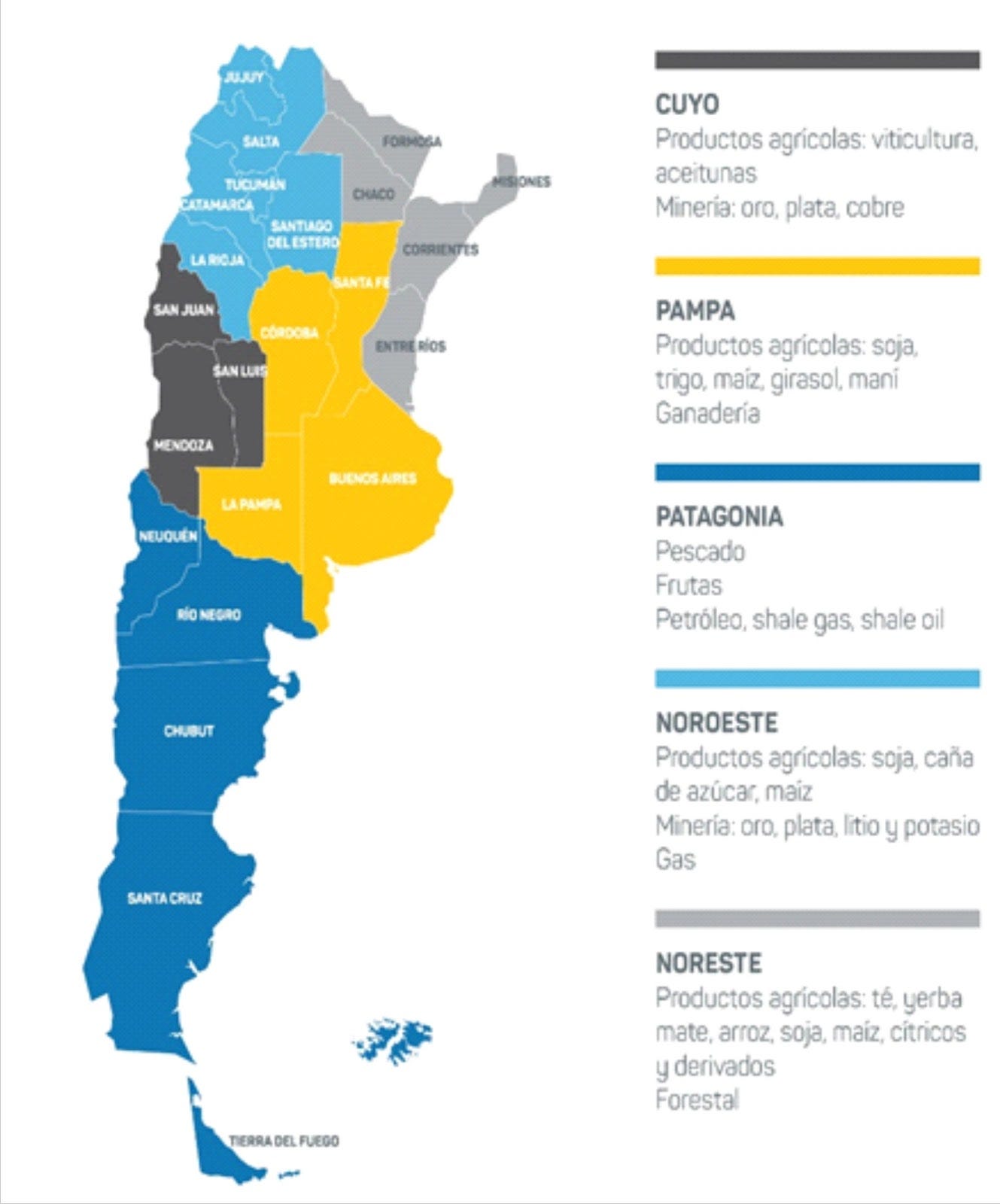Buying property in Argentina - Part 2
A deep dive into buying land in Argentina
Case for buying land in Argentina
Sure, some might say that buying land in Argentina is a bit of a gamble. After all, the country has been through some tough times economically in recent years. Like we mentioned in part 1 of this 2 part series, owning property in Argentina is for degens only. Same goes for land.
If you're willing to take the risk and stake part of your US tokens here, there's the potential for big rewards.
Argentina is a vast and beautiful country with a lot to offer. Climate is pretty diverse, and you can find everything from desert (northeast), pampas (center), subtropics (north) to glaciers (further down south).
I encourage everyone with the time to travel to various parts of the country. Buenos Aires is a good base for maintaining your WiFi US token stream while travelling to other regions. This is all the same country, and that is not even touching the surface:

Right now, land prices are relatively low. After covid and the ongoing economic crisis property sales have ground to a halt. So if you're thinking about buying land here, now or in the near future is probably a good time to do so.
Natural resources
Argentina resource rich. From the fertile farmlands of the Pampas to the mineral-rich mountains of the Andes, the country has a wide variety of natural resources that are essential to its economy. The most important resources found in Argentina are agricultural products, minerals, and oil.
The provinces of Buenos Aires, Santa Fe, and Cordoba are the heart of Argentina's agriculture industry. The rich soils of the Pampas region are perfect for growing crops like wheat, corn, and soybeans.
This is also one of the reasons why with global food shortages, Argentina is probably a good place to be. Enough beef and wheat to go around and never have to be forced to eat insect burgers or lab-grown meat.
The province of Mendoza and Salta are famous for their vineyards, which produce some of the best wines in the world. Tierra del Fuego, Chubut and Neuquén are home to vast reserves of oil and gas.
Jujuy is rich in minerals like copper, gold, silver and lithium. Jujuy is part of the extensive salt flats shared by Argentina, Bolivia and Chile, the so-called "lithium triangle" which contains the world's largest lithium reserves. Probably just a matter of time before we see a big Tesla-funded mining operation in this region.
Geo-arbitrage is not just for currency arb, Jungle
From a geopolitical perspective, Argentina is one of the most interesting countries to reside in long term. Of course, US residents know that they have many geographical advantages and great soil etc, but Argentina is a close second on the same continent and roughly within the same timezone.
If you’ve read Disunited Nations by Peter Zeihan, you know what kind of regionalized geopolitical world we’re heading towards.
Despite the name of the Argentina chapter (The Politics of Self-Destruction), Zeihan’s report card for Argentina for this century is surprisingly positive.
He mentions that even if the country’s political class manages to f* everything up, thanks to geography, demographics and resources, Argentina will still be okay in the next 50 years.
Some key points from Disunited Nations on Argentina:
Some of the most secure geography on the planet (no direct threats)
Incredibly resource rich (agriculture and minerals etc)
Unlike Brazil, Argentina has a young and healthy demographic profile
Despite Argentina’s economic failures, its future remains bright
Argentina has everything it needs to dominate its neighborhood
In Zeihan’s view the world will continue to de-globalize, and regionalize further in this century. With the covid madness we have seen an acceleration of this process. Regionalization is likely only to intensify even more in coming years, something also discussed in The Sovereign Individual.
Why does this matter? Think about your WiFi money, and where you live. I’m not some doomsday prepper, but living here does give me certain comfort in the sense that at least Argentina is removed far enough from most coming shitstorms (Europe with Nato/Russia, and Southeast Asia possibly with Taiwan). US is similar in that sense.
In the words of Arbitrage Andy (emphasis added):
I encourage all of you to make moves to become healthier mentally and physically, improve your finances, lock down you asset accumulation strategy, and reconsider where you live physically.
Living in an area that has all the resources you need to survive (at a really affordable price) is a good way to protect yourself and your family. If we see more food shortages, worldwide inflation in USD terms, more pandemics, you name it, you'll be able to survive because you won't have to rely on others for food, water, and shelter.
And if things never get that bad, you'll still be living in a beautiful place with everything you need.
Regulations for foreign buyers
From a legal perspective, it is important to keep in mind that there are different rules for foreigners acquiring land in Argentina. In 2012, Law 26,737 put into effect the “Regime for the Protection of the National Domain of Property, Possession or Tenure of Rural Land”, commonly known as the Land Law or Ley de Tierras in Spanish.
This law limits land sales to foreigners in Argentina to a maximum of 15% of the national territory and forces the provinces to report the amount of land in the hands of foreign individuals or foreign corporations.
Among other points, it established that a foreigner can’t have more than 1,000 hectares (2,470 acres) in a core agricultural zone. Any one nationality, in turn, cannot exceed 4.5% of the land of a department, a province or the country as a whole.
Is this a problem? Not yet.
Luckily for foreigners, Argentina is a big country and still far a ways off from 15% foreign ownership. However, in recent years many cantillionaires have started dipping their tows into Argentine land, specifically with regards to land with access to fresh water in the Northeast (Misiones) and the South (Patagonia region).
Some examples are the Dutch king (and Argentine wife), Luciano Benetton (90,000 hectares, eventually sold to Ward Lay), Ted Turner (37,000 hectares), Douglas Tompkins (5,000,000 hectares, eventually donated as national parks to Argentine government), Joe Lewis (11,000 hectares) and many others.
Numbers / foreign ownership
When the Land Law entered into effect, on a country level 6.09% of land was in foreign hands. By 2017 it had dropped to 5.57% and in 2020 the official reports reflect that foreign ownership dropped to 5.01%.

On this website you can filter on nationality invested (majority is US, Italian and Spanish investors) to get an idea with regards to the provinces and regions where foreign ownership is higher. Keep in mind that this is all measured in hectares (1 hectare = 2.47 acres) and that data is from 2018.
Word of warning: property caretakers
Ideally once you decide to buy land in Argentina, you either have to keep an eye on it personally or have a local do it for you. This because ocupas, illegal occupiers, can technically occupy your land and legally it is very hard to get them off afterwards (especially if they stay there with children).
Not saying this is very common, and it all depends on the area as well, but you have to be aware that it exists and could happen.
In the last few years there has been a pretty gnarly situation in the south with the indigenous Mapuche community illegally hacking/occupying private property, and in some cases the state sided with the hackers.
Eventually these ocupas were removed by force, but these situations are best avoided by having caretakers or living on the property yourself.
You can see this kind of bizarre legislation against private property ownership popping up everywhere - latest example is Commiefornia’s latest onslaught against property owners:
Other countries are in the early stages of implementing a copy of Argentine policies (that includes inflation stimmies, printing to fund deficits, absurd protection for occupiers, etc). We all know where that ends: more inflation and wrong incentives (people trying to gain the system).
The difference is that Argentine policies in a first world country don’t give you the benefit of currency arbitrage, land is expensive and scarce, and inflation hits you a lot harder. For Europe specifically it is unsure if resources will even be close to enough to sustain the same quality of life in the near future.
Personal plans
Personally I bought a plot in a medium town in Salta (Cafayate), with the idea of some day building a prefab Airbnb for wine tourists. Or I just leave it there for a future date.
This was a great deal for a 2,700 feet plot of land on walking distance from the main plaza, in a beautiful valley that never stops producing some of the best wines you’ve ever tasted.
This plot was also acquired in a “pozo-like”1 structure: instalments of devaluating pesos (adjusted for inflation), which makes the initial 15k US token more like 10k US when I finish paying the last instalment.
Even if I just decide to let the plot sit there, urbanization in that part of the town is picking up, and the scenery won’t change so value will likely go up over time. Land is finite, and land with resources and a great location even more so.
Prices & Recommended Platforms
Land can seriously go from $1k/ha (roughly $500/acre) with financing options, all the way up to 20-30x that amount, depending on location, access to waterways, etc.
If you are serious about buying some land, you have to visit the plot and actually verify that it is as advertised. For all things in Argentina that involve more than $2K US token: Don’t trust, verify.
Here are some sites that give a better idea of how disperse pricing is for land (in no particular order, but with direct links to the “campos/lotes” sections):
Comment section is open for all subs, so let me know if you have any additional questions (can include questions about part 1 of this series).
See part 1 of the series for an explanation of the pozo concept







Would it be foolish to get an Argentine passport considering the state of the country? I’m a US citizen but would be eligible through a parent. I don’t have a second passport.
What can you say about the golf situation in Argentina? BA specifically. Here's what I've been able to gather so far... Argentina has the highest number of golf courses of any Latin American country. Most importantly for tourists and actual or potential expats, apparently, some, many or all of the even exclusive private golf clubs seem to open theirs course to the public at least a couple days per week. And the green fees are only around $40 USD. Even the private clubs are hurting so bad from the economic situation that private doesn't even mean totally private. Although what non-wealthy Argentine could afford $40 to play a round of golf, or would golf in the first place. Can you verify this, or do an article about the golf scene in BA. Pretty certain that's the main hobby of the type of people reading your site.